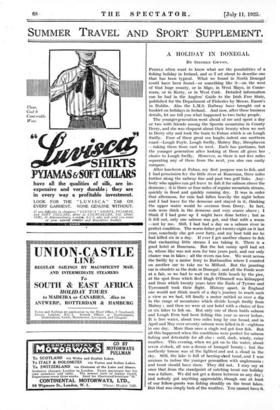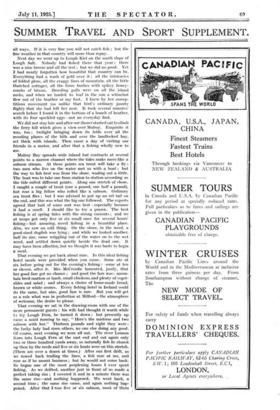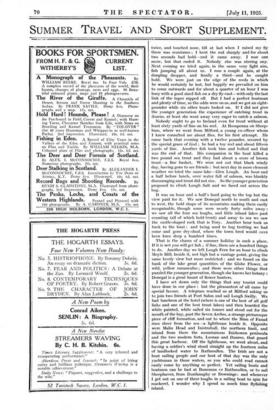A HOLIDAY IN DONEGAL
BY STEPHEN GWYNN.
PEOPLE often want to know what are the possibilities of a fishing holiday in Ireland, and so I set about to describe one that has been typical. What we found in North Donegal could have been found—or something like it—on the west of that huge county, or in Sligo, in West Mayo, in Conne- mara, or in Kerry, or in West Cork. Detailed information can be had in the Anglers' Guide to the Irish Free State, published for the Department of Fisheries by Messrs. Eason's in Dublin. Also the L.M.S. Railway have brought out a booklet on holidays in Ireland. And now, after these business details, let me tell you what happened to two lucky people.
The younger generation went ahead of me and spent a day or two with friends among the Sperrin mountains in County Derry, and she was eloquent about their beauty when we met in Derry city and took the train to Fahan which is on Lough Swilly. Four of these great sea loughs indent one northern coast—Lough Foyle, Lough Swilly, Mulroy Bay, Sheephaven —taking them from east to west. Each has partisans, but the younger generation after looking at them all gives her _ choice to Lough Swilly. However, as there is not five miles separating any of them from the next, you also can easily compare.
After luncheon at Fahan, my first purpose was to fish, and I had permission fcr the little river at Buncrana, three miles further along the railway line and past two golf links. Any- body who applies can get leave to fish it for salmon above the demesne ; it is three or four miles of regular mountain stream, quickly in flood and quickly running dry. It was in order that afternoon, for rain had fallen heavily the night before and I had leave for the demesne and stayed in it, thinking the upper water would be overrun from Deny. In fact, rods were thick in the demesne and very scarce above ; I think if I had gone up I might have done better ; but as it fell out, only one salmon was got, and that with a worm —not by me. Still, I had had a day on a salmon river in perfect condition. The worm fisher got twenty-eight on it last year, somebody else got over forty, and my host told me he had killed six in a day. If ever I get another chance to fish that enchanting little stream I am taking it. There is a good hotel at Buncrana. But the hot sunny spell had set in, whose like was not seen for two years past, and our only chance was in lakes ; all the rivers ran low. We went across the Swilly by a motor ferry to Rathmullen where I counted on another car to take me to Milford. But the jaunting car is obsolete as the dodo in Donegal ; and all the Fords were at a fair, so we had to watt on the little beach by the pier, at the spot from which Red Hugh O'Donnell was kidnapped and from which twenty years later the Earls of Tyrone and Tyrconnell took their flight. History apart, in England one would not think much of a day's journey to reach such a view as we had, till finally a motor rattled us over a dip in the range of mountains which divide Lough Swilly from Mulroy ; and then we were at our hotel with a choice of five or six lakes to fish on. But only one of them holds salmon
and Lough Fern had been fishing this year as never before. It is free water, about two miles long by one broad, and in April and May over seventy salmon were killed in it—eighteen in one day. More than once a single rod got four fish. But all this happened when the conditions were perfect for salmon fishing and detestable for all else : cold, dark, windy, rainy weather. This evening, when we got on to the water, about seven o'clock, all was a dream of tranquil beauty ; but the northerly breeze was of the lightest and not a cloud in the sky. Still, the lake is full of herring-shed trout, and I was anxious to imbue the younger gene4ation with anglomania and trout should have risen. They did not. I may say at once that from the standpoint of catching trout our holiday was a failure. We did not get a dozen between us any day ; and nobody got anything appreciable, though one at least of our fellow-guests was fishing steadily on the trout lakes.. But that was simply luck of the weather. You cannot have it
all ways. If it is very fine you will not catch fish ; but the fine weather in that country will more than repay.
Next day we went up to Lough Kiel on the south slope of Lough Salt. Nobody had fished there that year ; there was a nice breeze and all the rest ; but we did no good. Yet I had nearly forgotten how beautiful that country can be. Everything had a wash of gold over it : all the intricacies of folded glens, all the craggy lines of mountain, all the little thatched cottages, all the furze bushes with spikey honey- combs of bloom. Breeding gulls were on all the island rocks, and when we landed to loaf in the sun a whinchat flew out of the heather at my foot. I knew by her surrep- titious movement (so unlike that bird's ordinary jaunty flight) that she had left her nest. It took several minutes' search before I found it in the bottom of a bunch of heather, with its four speckled eggs—not an everyday find.
We did not stay late and after our dinner started out to climb the ferry hill which gives a view over Mulroy. Exquisite it was, too ; twilight bringing down its folds over all the receding planes of the hills and over the landlocked bay, set thick with islands. Then came a day of visiting our friends in a motor, and after that a fishing wholly new to me.
Mulroy Bay spreads wide inland but contracts at several points to a narrow channel where the tides make races like a salmon stream. At these points sea trout will take a fly ; two men who live on the water met us with a boat ; but the way to fish best was from the shore, wading out a little. The boat was to take one from station to station according as the tide suited different points. Along one stretch of shore, I caught a couple of trout (one a pound, one half a pound), but rose a big fellow who rolled like a salmon. Ordinary sea trout flies ; but I was advised to put up an eel tail on the end, and this was what the big one followed. The experts agreed that bait of some sort was best—especially because it had a smell. I should like to try a prawn. The best fishing is at spring tides with the strong currents ; and we at neaps got only five or six small ones for several hours' fishing—but amusing, novel fishing in a beautiful place.
Also, we saw an odd thing. On the shore, in the weed, a good-sized dogfish was lying ; and while we looked another,
half its size, came wriggling out of the water on to the wet weed, and settled down quietly beside the dead one. It may have been affection, but we thought it was haste to begin a meal.
That evening we got back about nine. In this ideal fishing hotel meals were provided when you came. Some ate at
six before going out for the evening's fishing : some at ten or eleven, after it. Mrs. McCreadie lamented, justly, that her good fare got no chance ; and good the fare was : moun- tain bred mutton or lamb, small chickens, and plenty of veget- ables and salad ; and always a choice of home-made bread, brown or white scones. Every fishing hotel in Ireland could do the same, but alas, good fare is rare. But you will get as a rule what was in perfection at Milford—the atmosphere of welcome, the desire to please.
That evening we sat in the drawing-room with one of the more permanent guests : his wife had thought it worth while to try Lough Fern, he turned it down ; but presently up came a maid running to say, " Here's the mistress and two salmon with her." Thirteen pounds and eight they were : the lucky lady had risen others, no one else doing any good.
Of course, next evening we were all out. The river Lennon flows into Lough Fern at the east end and out again only two or three hundred yards away, so naturally fish lie closest up then by the reeds and five or six boats were on this stretch. (There are over a dozen at times.) After our first drift, as we rowed back trailing the lines, a fish rose at me, and rose as if he meant business ; but he would not come back. So began one of the most perplexing hours I ever spent fishing. As we drifted, another just in front of us made a perfect taking rise ; I covered it and in a minute there was the same rise—and nothing happened. We went back, a second time ; the same rise came, and again nothing hap- pened. After that I rose five or six salmon, most of them
twice, and touched none, till at last when I raised my fly there was resistance ; I bent the rod sharply and for about two seconds had hold-and it came away. I rose one more, but that ended it. Nobody else was stirring any, Next evening we tried again, in the same very light airs, fish jumping all about us. I rose a couple again, at the dangling dropper, and finally a third-and he caught hold. We were just on the edge of the reeds in which he would certainly be lost, but happily we prevailed on him to come outwards and for about a quarter of an hour I was busy with a good sized fish on a dry fly-cast-with only the last link of the taper nipped off. But I had a perfect boatman and plenty of time, so the odds were on us, and we got an eight- pounder while six other boats looked on. If I did not give the younger generation the experience of catching trout in dozens, at least she went away very eager to catch a salmon.
Nobody ought to go to Ireland even for trout without at least sixty yards of line on his reel. At Rosapenna on Sheep- ham, where we went from Milford, a young ex-officer whom I knew consulted me about flies, for his first attempt. He came back that evening with a twelve pounder, secured by the special grace of God ; he had a toy reel and about fifteen yards of line. Another fish took him and bolted and that was the end of that. His companion in the boat killed a two pound sea trout and they had about a score of browp trout-a fine basket. We were not out that black windy day, -having gone to see friends : but next day in more clement weather we tried the same lake-Glen Lough. An hour and a half before lunch, over water full of salmon, was blankly discouraging and trout did not rise. So the younger generation proposed to climb Lough Salt and we faced out across the bog.
It was an hour and a half's hard going to the top but the view paid for it. We saw Donegal north to south and east to west, the bold shape of its mountains making them easily recognizable, though some were nearly forty miles away : we saw- all the four sea loughs, and little inland lakes past counting (all of which hold trout) and away to sea we saw the castle-shaped rock that is Tory. Another hour took us back to the boat : and being used to bog trotting we had come and gone dry-shod, where the town bred would have been knee deep a hundred times.
That is the charm of a summer holiday in such a place. If it is wet you will get fish ; if fine, there are a hundred things to do. Another day we left Lough Fern for an hour to climb Moyle Hill, beside- it, not high but a vantage point, giving the same lovely view but more restricted : and we found on the bank of the lake great quantities of the Globe Flower, or wild, yellow ranunculus ; and there were other things that puzzled the younger generation, though she knows her botany : Donegal is a great haunt of flower hunters.
I have set down only the things that any tourist could have done in our place : but the pleasantest of all came by special favour. A telegram reached us at Milford asking us to join two friends at Port Salon and sail Lough Swilly. We had luncheon at the hotel (where is one of the best of all golf links and one of the best trout lakes) and then boarded the white painted, white sailed six tonner and stood out for the mouth of the bay, past the Seven Arches, a strange picturesque piece of cliff formation, and out to where the Binn of Fanad rises sheer from the sea-a lighthouse beside it. Opposite were Malin Head and Inistrahull, the northern limit, and inland from there the mountainous Inishowen peninsula and the two modern forts, Leenan -and Dunree, that guard this great harbour. Off the lighthouse, we went about, and having a soldier's wind stood straight up the fourteen miles of landlocked water to Rathmullen. The Irish are not a boat sailing people and our host of that day was the only yachtsman in those waters, so you who could read cannot easily come by anything so perfect. Yet sailing boats and boatmen can be had at Buncrana or Rathmullen, or to sail Sheephaven, from Dunfanaghy or Downings : and whenever I get out on one of these loughs in a sailing boat to spin for mackerel, I wonder why I spend so much time flyfishing inland.




























































 Previous page
Previous page